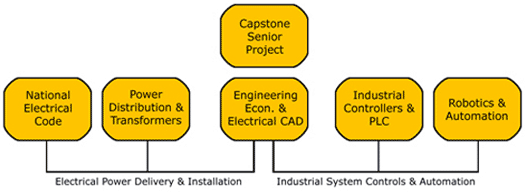Electrical Engineering is an applied science that encompasses a broad range of activities that is continuously shifting and becoming even more diversified. The wide-ranging field is critical to the development of virtually every field of science, technology and medicine.
Today, electrical engineering as a discipline envelops an assortment of technological areas, including analog and digital electronics, computer-aided design and manufacturing, intelligent robotic systems, computer-based control systems, wireless communication systems, data storage systems, machinery controls, wiring, embedded systems, optical data processing, medical imaging systems and many other devices used in practically every field of human endeavor.
Electrical Engineers are employed in many industries such as manufacturing, transportation, construction, business, education, government, healthcare and other sectors. Persons entering this field typically enter one of several specialties, within which may become involved with design, production, application, sales or management.
The School of Engineering at SCIT is dedicated to continue the development of innovative engineering programs and is proud to offer a Bachelors Degree Program in Electrical Engineering (BSEE). Our program is designed to prepare students for careers in industry or business by providing the foundation on a common electrical engineering theme of using electrical signals for the generation, transmission, storage, conversion, and installation of electrical energy and power systems. To discus the breadth and coverage of the BSEE program, it is helpful to illustrate the groupings of courses within the BSEE Curriculum.

These five primary subject areas are fundamental to the BSEE curriculum. They are structured to provide electrical engineers with the practical knowledge and tools to design, develop, test, install and/or supervise the manufacture of electrical equipment, which may include electrical motors, machinery and automation controls, robotic control, lighting and wiring of buildings, power generation, and transmission devices used by electrical utilities. The courses are a balanced mix of engineering principles and practice, as well as hands-on laboratory experiences involving team-based projects.
A Capstone Senior Project provides students the opportunity to pull together and apply ideas and concepts learned throughout the curriculum. Engineering is an applied science, and we believe the best way to learn an applied science is by doing.